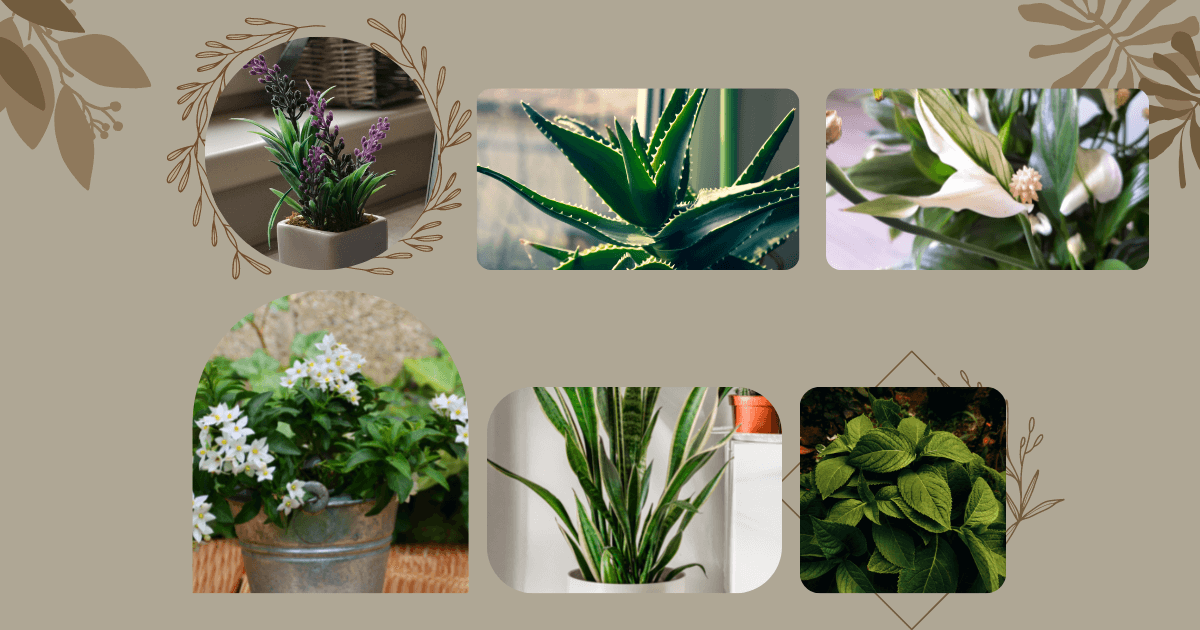Toxic pollutants like formaldehyde and toluene, which affect your sleep, temperament, and energy levels, can be absorbed by Snake Plants, which offer a charming touch of greenery to your home.
The addition of houseplants instantly elevates the appearance of a room and gives you the impression that you’ve got your life together. Houseplants aren’t just good for your home’s aesthetics; they’re also good for your ways to relieve stress. Studies have shown that being among plants and gardening can help sleeplessness and also reduce stress and anxiety.
By lowering pollutants in the air, many plants help to reduce stress and thus help to relieve anxiety. The aromatherapy of plants like lavender and peppermint, for example, has been shown to alleviate stress options. Start your self-care journey by picking up some of the following plants.
The jasmine plant has a calming effect on the mind and body, reducing stress and anxiety.
1. Lavender Plant
Many stress-relieving treatments contain lavender because of its soothing scent and visual appeal. Linalool, an alcohol found in the plant, is responsible for the antidepressant, release tension, muscle-relaxing, and antioxidant effects. Whether you maintain it in a container or integrate it into the landscape of your garden, this perennial shrub will thrive with little effort on your part. It has a high tolerance for dry conditions and will reward you with beautiful blooms if you give it regular nutrition.
2. Jasmine Plant
We underestimate the value of this lovely shrub with its fragrant white blossoms. In addition to being beautiful, this plant provides a soothing effect on the body and best anxiety relief. The jasmine plant has a calming effect on the mind and body, reducing stress and anxiety. Improved cognition and a more alert body lead to increased productivity on a daily basis. You’ll be more alert, relaxed, and your bedroom will smell great with this plant in it. It also enhances the aesthetics of your space.
3. Snake Plant
Toxic pollutants like formaldehyde and toluene, which affect your sleep, temperament, and energy levels, can be absorbed by Snake Plants, which offer a charming touch of greenery to your home. In most houses, snake plants thrive because of their preference for dry soil and the fact that they do not mind if you are not the most meticulous waterer.
Any inexperienced gardeners who are looking for a plant that has a favorable effect on their mental health while also looking nice in their house would benefit greatly from having this plant as an indoor plant, as it would be the ideal alternative for an inside decoration.
Peppermint is also known to increase tranquility and attentiveness.
4. Aloe Vera
We’ve all heard of Aloe Vera’s anti-inflammatory powers, and chances are you’ve used it to treat sunburn, acne, or eczema. However, the plant’s air-purifying properties also make it a useful addition to the surroundings. Keep it in the kitchen or the bathroom, as these are the rooms with the most pollutants. This thorny succulent enjoys bright light and should be watered once a week. If you want your plant to look as lush and healthy as possible after you take cuttings, pluck each leaf individually.
Additionally, the Aloe Vera plant is capable of removing hazardous compounds from the air. These chemicals have the potential to have an effect on our respiratory system as well as cause emotions of stress and unease.
5. English ivy
You should avoid eating English ivy, but it has been demonstrated to lower mould and fecal matter levels as well as it purifies the atmosphere. The fresh air can help reduce stress. It’s a reasonably easy plant to care for, with thick, lobed, glossy leaves that climb and trail for a beautiful rustic appearance. Ivy grows in a well-lit area and in soil that is slightly dry. With enough sunshine, English ivy should thrive for your garden!
6. Peppermint
Studies have connected peppermint to decreased anxiety and exhaustion, which is one of the reasons why it is so popular. Peppermint is also known to increase tranquility and attentiveness.
It contains a component known as menthol, which is a component that is frequently found in bath treatments designed to calm muscles. In addition to its ability to help people relax, peppermint is also simple to cultivate in a kitchen garden; as long as you provide it with an adequate amount of water, the plant should continue to grow and spread. If you choose to cultivate it outside, you should take precautions to shield it from the heat, as the peppermint leaves are easily charred.
7. Peace lily
A stunning peace lily, with its dark green foliage and dazzling white spathes, can help you relax. This beautiful plant is a great air purifier, eliminating acetone fumes and mould spores that might disrupt your sleep. In addition, it’s relatively easy to care for, requiring only that you keep its soil moist but not overwater it, and that you provide it with bright indirect light.
8. Basil Plant
There are numerous health benefits to the holy basil plant, such as alleviating a sore throat, treating stomach ulcers, treating insect bites, and so on. But did you know that it also has a positive effect on your mental health?? You can improve mental clarity and reduce stress by having a basil plant in your home or office. It’s also a well-liked antidepressant.
Stress relief ashwagandha can help if you have a lot of stress and worry. Before taking ashwagandha, you should talk to a doctor, though.
Composed by: “Nakshatra Nair is presently working in digital marketing. She has a decade of experience in content writing and marketing.”

